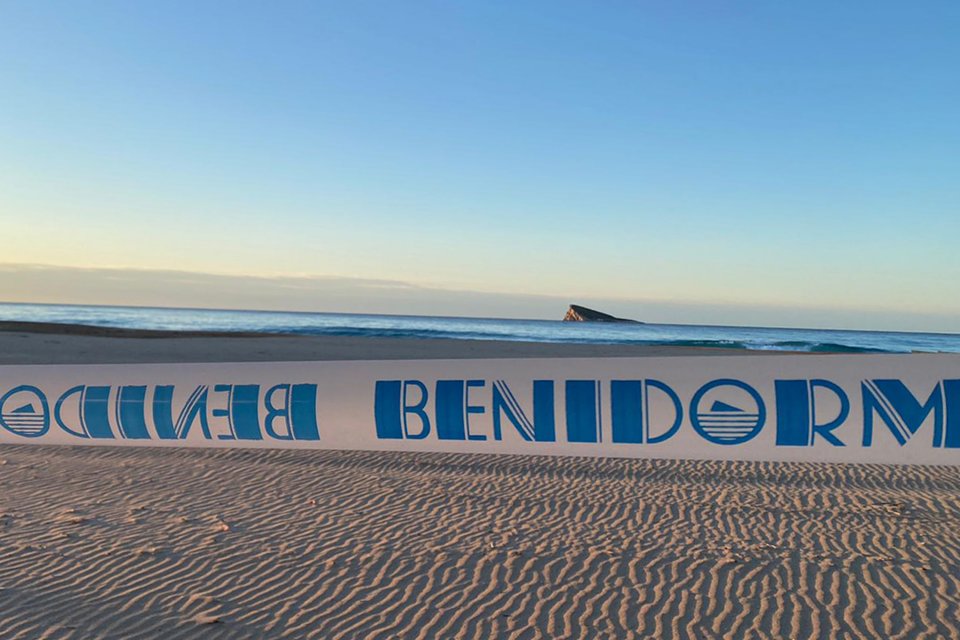Beaches re-open, except in Benidorm
On Monday 1 June the Valencia region moves as a whole into Phase Two. This means beaches, swimming pools, restaurants, cinemas, theatres and other cultural venues can now re-open, but with many conditions. (For a complete list of what you can and can’t do in Phase Two, see our full guide here: Lifting of Lockdown in Spain).
One of the most anxiously awaited questions in the Valencia region has been how beaches would re-open. It seems it will be with 2-metre distancing between towels and beach paraphernalia and with limits on numbers.
Swimming pools will be limited to 30% occupancy and access will be by time slots. Facilities will also need to be cleaned and disinfected three times a day, with residential community pools possibly using some sort of reservation app.

One place, however, that won’t be re-opening its beaches just yet is Benidorm.
In a last-minute change of plan on Friday evening, the town council took the decision to wait until mid-June to open its famous beaches.
Benidorm mayor Toni Pérez said that the decision had been taken from the point of view of ‘prudence and caution’, adding that it was the responsible thing to do. He explained that the council has been working on how to re-open their beaches safely since they were closed on 13 March – and that they had since been working towards doing so for Phase Three.
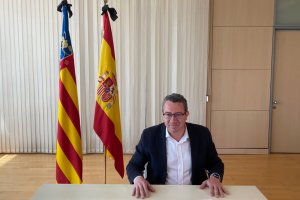
The re-opening plan is still being worked on and will rely heavily on technology. The last technical adjustments need to be made, but the mayor explained, ‘The beaches will have a morning and afternoon timetable as the capacity will have to reduce by more than 50%.’
Pérez didn’t give the exact times of the morning and afternoon slots, but he did say the beaches would be emptied at midday to allow for cleaning and disinfecting of communal areas and that at night the beaches would remain closed.
He added that there would be controls on numbers on the beaches and enforcement of the 2-metre distance rule. He did, however, say that the treatment and management of the beaches in the ‘new normality’ created by the Covid-19 crisis could not be the same in the urban beaches of Benidorm as in the coves and bays of other coastal towns.
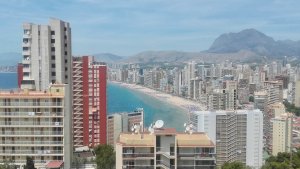
Park de Foietes, the last closed green area in Benidorm, has now partially re-opened and Pérez was keen to remind people that during lockdown the council has been allocating more areas for walking and doing sport, as well as adding new spaces and pedestrianising streets. He pointed out that the town has 9.5km of pedestrianised streets, 5km of seafront promenades, 91km of bike lanes and almost 270,000 m2 of green areas.
Tourism
Valencia, which as a region relies heavily on tourism, has been badly hit by the Coronavirus pandemic. The question now is: can it claw back something from this season?
Last weekend Spanish Prime Minister Pedro Sánchez announced that the 14-day quarantine on incoming foreign visitors would be dropped from July, meaning that businesses in the hospitality industry could start getting things moving again.
This is incredibly important for many areas along the Costa Blanca, where the vast majority of their business comes from the UK. Although the evolution of the disease in the UK itself will also be an important factor.
Iberia Airlines announced on Thursday that they would be offering short and medium haul flights to 40 destinations across Spain and Europe in July, extending that to 53 in August. In June they will continue to offer flights as they have in May, for reasons of force majeure.
ALSO READ: Ryanair plans to restore 40% of flights from 1 July
In an effort to bring in more national tourism, the Valencia Tourist Department has launched the #SueñaElMediterráneoEnVivo campaign, which aims to remind people what the region has to offer and encourage them to visit again.
Francesc Colomer, councillor for Valencian Tourism, explained that the video shows different Mediterranean experiences which we can all enjoy again. As part of the campaign, short video clips have also been published on social media showing cycle tourism, diving, bird-watching, mountaineering and city tourism. More videos will soon be released featuring other important aspects of tourism the region has to offer like beaches, towns, culture, the silk route and ecotourism.
Beach Businesses
Meanwhile businesses related to Costa Blanca’s beaches have created a group to campaign for their interests. Owners of businesses linked to beach bars, equipment hire and sports activities, who would normally have been doing good business during the months of April and May, have been badly hit by the lockdown. The newly-formed Costa Blanca Beach Business Association, aims to protect their interests and provide quality services for tourists throughout the region.
Further north in the region, the Castellón ‘Holiday City’ Marina d’Or has also announced it will re-open on 1 July.
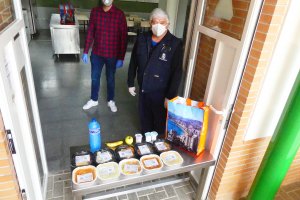
Helping hand
Vicent Marzà, responsible for the Valencian Education Department, announced this week a further 15,000 tablets to be made available to the most vulnerable students. This comes on top of the already promised 14,000 tablets. Marzà said, ‘At the start of the academic year, we’ll have 29,000 tablets to reduce the digital breech. We’ll never stop working to make sure that nobody is left behind.’
Toni Pérez, Benidorm mayor, also confirmed that the council would continue delivering free meals to those children which have been receiving them, until the end of June. The weekly delivery of food started on 7 April for students who didn’t qualify for the regional government’s ‘shopping voucher’ scheme. By the end of June more than 84,000 menus will have been delivered to around 1,000 youngsters.
School Admissions
As mentioned in last week’s round-up, the Valencian government has set up a special section on its education website. Some parts are still being worked on and you can’t actually log in yet – but there’s lots of information explaining how the process of enrolment will work, including dates for each educational stage. The information is available in Valencian or Spanish and you can find it by clicking here.
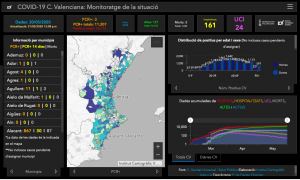
Covid-19 app
If, while locked down in your own home, you’ve been wondering how many cases of Covid-19 there have been in your town, a new app released on Thursday by the Valencian Health Department will tell you. It allows users to view Coronavirus rates in all towns across the region, displaying how many people have tested positive and how many deaths have occurred. You can view it by clicking here.
Covid Water project
Peñíscola becomes the latest town to join the Covid Water project, which aims to prevent resurgences of the disease by studying wastewater.
The company carrying out the project in the town, FACSA, along with the town hall, will study residual water to detect traces of Coronavirus in it. Several towns in the region are already using the technique at their water purifying plants.
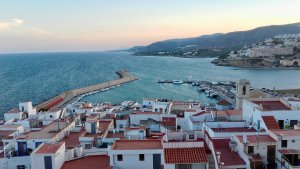
Peñíscola mayor, Andrés Martínez, said, ‘It’s a useful alert system, that in the case of detecting the presence of the virus, would give us more precise information which could be a warning about possible future infections.’
Moving to Phase Two
As we gradually move out of lockdown, we should take a moment to think about why we’ve all been kept inside for so long.
It’s important to remember that de-escalation does not equal the end of the pandemic, not by any stretch of the imagination. This is a message that Ana Barceló, head of the Valencian Health Department, has been trying to get across with the #AmbPrudencia campaign, with videos of first-hand accounts from survivors of Coronavirus talking about their experiences. [The link is within the Tweet below].
▶️ @GVAsanitat llança la campaña #AmbPrudencia. Testimonis reals de persones que han patit la malaltia són aquelles que ens narren la seua experiència per a demanar-nos prudència en esta fase d'avanç cap a la normalitat.#XtuXmi#EsteVirusElParemUnits pic.twitter.com/YXJYJ5enIs
— GVA Sanitat (@GVAsanitat) May 26, 2020
Some of the tales are harrowing but the aim is to try and encourage the public to obey the rules, wear face masks in situations where necessary, not to go to crowded areas and to avoid scenes like those seen at Valencia marina last weekend.
This video, showing crowded bars, went viral on social media and in the press:
The crowds of youngsters in the video are so large, making social distancing very difficult, and few people are wearing face masks. As a result there have been fines, terrace licences rescinded, and cameras fitted in the bars.
Bar owners complained that people need to be more responsible and that it had been impossible for them to keep people apart.
Go out with Prudence
If we continue to go out and mix without protection or social distancing, how long will it be until we see another spike in infection numbers? But, as we know, it’s unlikely to be the youngsters seen in the video who will become ill, the victims will be their parents, their grandparents. So, let’s heed the health minister’s advice, and when we go out this week with a bit more freedom, let’s go amb prudencia!
ALSO READ: Valencia in English – weekly round-up (24 May)
ALSO READ: Valencia in English – weekly round-up (17 May)
ALSO READ: Welcome to ‘Valencia in English’

